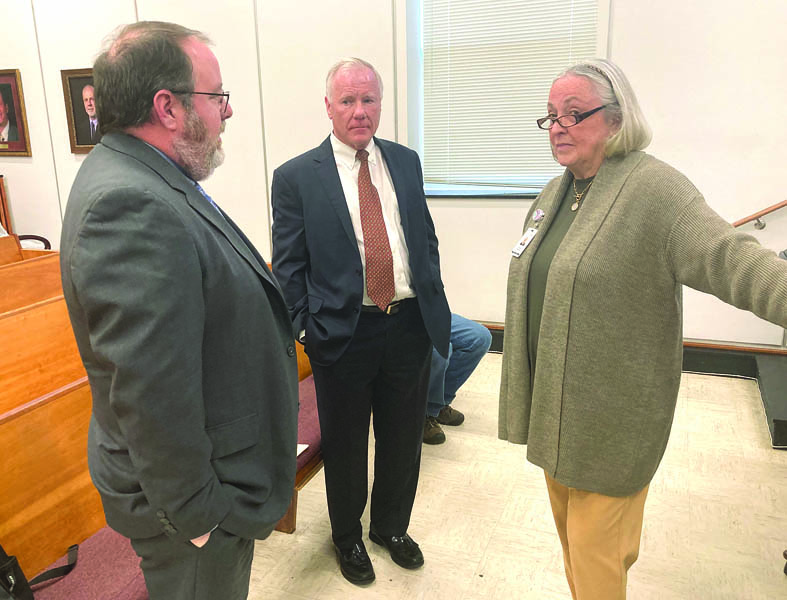The coal ash study
State still investigating at Bull Run; to make decision in ‘next three years’

Robert Wilkinson, coal combustion residuals technical manager for the Tennessee Department of Environment and Conservation; Pat Flood, senior advisor with TDEC and Anderson County Commissioner Catherine Denen- berg talk before a meeting of the Anderson County Commission’s Intergovernmental Committee. (photo:Ben Pounds )
Robert Wilkinson, the coal combustion residual technical manager for TDEC, spoke to the Anderson County Commission’s Intergovernmental Committee Monday, Feb. 13, at the county courthouse in Clinton. Coal combustion residuals refers to ash created by burning coal.
Wilkinson said TVA planned to submit a report explaining the contamination from ash on the site March 27. However, he said TDEC will go over what TVA says in that report with its own experts. He said he expected to see a final plan for how to deal with the ash between August 2024 and March 2025.
County Commissioner Tracy Wandell, whose district includes the Claxton and Bull Run areas, asked whether TDEC would be involved in the development of the site at the end of the process.
“We have determination of how we’re going to clean it up,” Wilkinson said. Wilkinson said TDEC can restrict uses, but the specific use is up to the future property owner.
“I’m not asking you to do the oversight per se, but I’d like to have TDEC’s wisdom, experience,” Wandell said in response, regarding redevelopment at Bull Run Fossil Plant. Pat Flood, senior advisor at TDEC who also spoke to the committee, explained that the future owner might need a new permit for its activities.
In the meantime, however, there are still more steps to go before TVA and TDEC even agree to a plan for how to deal with the ash. TDEC plans to go over TVA’s March 27 report, which will summarize environmental studies of coal ash contamination.
“We have to review every single line, every single data point that was generated and determine if TVA has made a correct assessment,” Wilkinson said. He said this report and TDEC’s review of it is necessary to decide what actions TVA needs to take regarding the ash.
TVA’s board of directors voted in February 2019 to close Bull Run Fossil Plant by December of this year. However, the coal ash from the plant in storage nearby has drawn the attention of the county government, Anderson County residents and regional environmental activist groups.
Many have expressed concerns about contamination from the ash seeping into the groundwater and streams near the site.
Wilkinson talked about studies TVA has already done and plans to do.
He described studies in 2019 of how water flows through the ground, and of streams from 2020 through 2022.
He said studies focused on Worthington Branch, which flows “almost in the middle of the facility” before reaching the Clinch River.
He said studies found coal ash in that stream, leading to additional studies. He also said other studies in 2021 looked at soils. Studies from 2021 through 2022 also looked at how stable the coal ash storage areas would be in general, but especially during earthquakes. TVA is currently taking samples from wells in the area, Wilkinson said.
“It is quite a long process,” he said of the studies.
Wilkinson said after all the back and forth between TVA and TDEC about the studies, the utility and the state agency will come up with a plan for what TVA should do with the site’s ash, and why.
He said this will include where the ash will end up, how to close off the current storage areas, and how to treat the water in the ground and on the surface near the site to avoid ash pollution. He said the public can comment on this plan from April through November of next year. Wilkinson said TDEC will address the public’s input from this comment period to create a final plan August 2023 to March 2025.
Ben Pounds is a freelance writer for The Courier-News. Follow him on Twitter @Bpoundsjournal.



